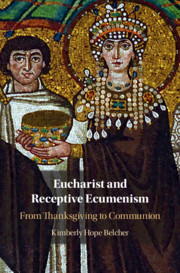Book contents
- Eucharist and Receptive Ecumenism
- Eucharist and Receptive Ecumenism
- Copyright page
- Contents
- Tables
- Preface
- Acknowledgments
- 1 The Call of Unity
- 2 Diversity Is the Tradition
- 3 A Phenomenology of Giving Thanks
- 4 Eucharistia and Revelation
- 5 Ambrose’s Words and the Roman Canon
- 6 Augustine and the Assembly’s Destiny
- 7 Consecrating and Offering the Ordinary
- 8 The Eschatological Exception
- 9 Outdo One Another in Showing Honor
- 10 Into the Heart of God
- Bibliography
- Index
3 - A Phenomenology of Giving Thanks
Published online by Cambridge University Press: 16 October 2020
- Eucharist and Receptive Ecumenism
- Eucharist and Receptive Ecumenism
- Copyright page
- Contents
- Tables
- Preface
- Acknowledgments
- 1 The Call of Unity
- 2 Diversity Is the Tradition
- 3 A Phenomenology of Giving Thanks
- 4 Eucharistia and Revelation
- 5 Ambrose’s Words and the Roman Canon
- 6 Augustine and the Assembly’s Destiny
- 7 Consecrating and Offering the Ordinary
- 8 The Eschatological Exception
- 9 Outdo One Another in Showing Honor
- 10 Into the Heart of God
- Bibliography
- Index
Summary
Ecumenical consensus now includes a widespread and growing agreement on the real presence of Christ in the Eucharist, and much less agreement on explanations, proper celebration, veneration, and disposal, as well as on the nature of sacrifice. While “presence” might thus be regarded as a good foundation for future work, recent developments in philosophical theology have thrown the notion of “presence” into disarray, exposing fissures between the metaphysical presuppositions of churches in dialogue with one another.1 In certain respects, too, agreement on presence has exacerbated the isolation of the eucharistic elements of bread and wine from the assembly, their liturgical action, and their ongoing cooperation in conversion. A phenomenological approach, I argue, can allow for an account of the personal encounter between Christ and his people in the Eucharist that respects both the dynamism of the human person and the liturgical context for sacramental change.2 Liturgical action, anamnesis, can be phenomenologically described as an erotic, willful retrieval of a gift, leaving room for different Christian communities to metaphysically explain that retrieval (or choose not to) in a way that defers the liturgical action’s effectiveness to God. In effect, this provides a way for Christians to agree on what they must agree on, while explicitly allowing for diversity to coexist with unity.
- Type
- Chapter
- Information
- Eucharist and Receptive EcumenismFrom Thanksgiving to Communion, pp. 54 - 79Publisher: Cambridge University PressPrint publication year: 2020

